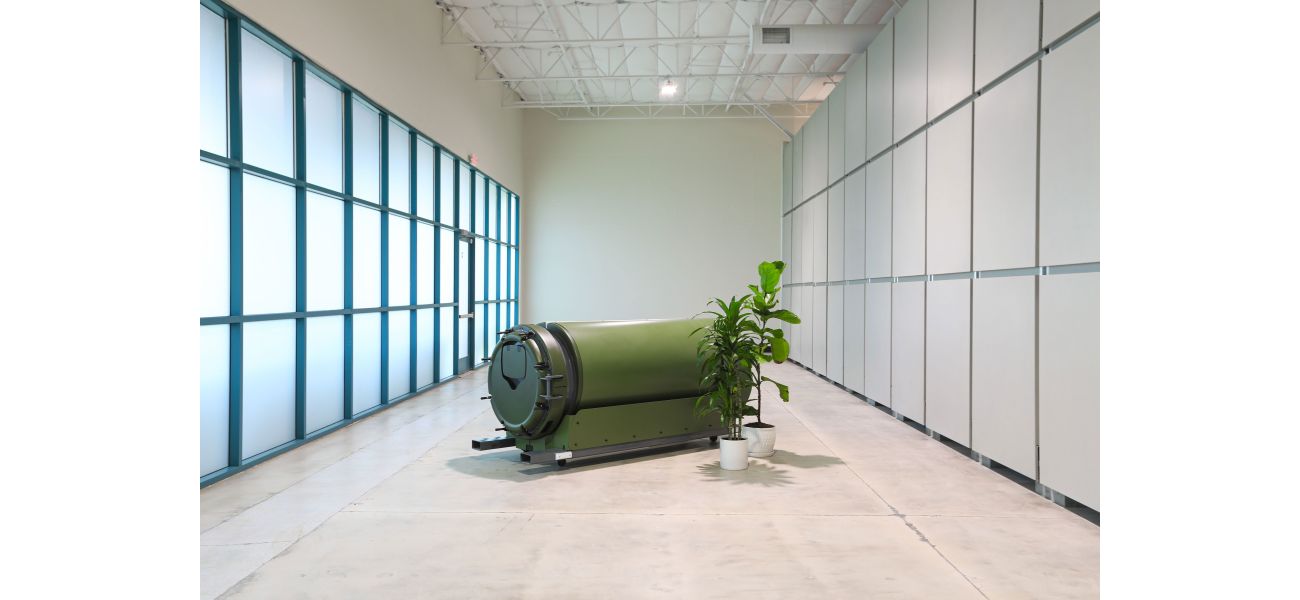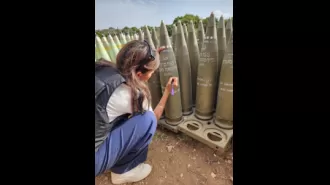More people are choosing human composting as an eco-friendly option for the afterlife.
Turning bodies into soil quickly, similar to what occurs naturally in forests, is the process of human composting.
December 29th 2024.

The passing of a loved one is a difficult and painful experience for anyone, and for Laura Muckenhoupt, it was no different. Her 22-year-old son, Miles, had left a void in the family after his death. But on the 12-hour drive home from the Washington state facility where Miles' body was turned into soil, Laura felt a glimmer of hope. Even though Miles was no longer physically with them, she could feel his presence in the empty seat next to her.
During the drive, Laura had a moment of clarity. She knew that she and her family would continue to be Miles' parents, sister, and friends, and they would honor his memory by growing him. It may sound strange to some, but for Laura, it was a way to keep Miles close and continue to care for him.
The process of turning a body into soil is known as human composting. According to Tom Harries, the chief executive of Earth Funeral, the company that the Muckenhoupt family worked with, it is simply speeding up what happens naturally on the forest floor. Harris explained that this method is much more environmentally friendly than traditional burials or cremation, which is known to be a significant source of carbon emissions.
The idea of using human composting as an end-of-life alternative is gaining popularity. It is a way to have a cleaner and more sustainable death, as Harries puts it. The process is relatively simple and takes about 45 days. The body is wrapped in a biodegradable shroud and placed in a metal capsule with a mixture of wood chips, mulch, and wildflowers. As it decomposes, it releases nitrogen, and the added natural materials provide carbon, creating perfect conditions for microbes to break down the body at a molecular level.
For Laura, the thought of her son's body turning into soil brought her some comfort during the initial stages of grief. And in the years since, Miles' soil has been used in various places, from as far as Indonesia and Tuscany to help grow different plants and trees. It's a fitting tribute to Miles, who was a dancer and loved spending time outdoors.
At Laura's home, Miles' soil was used to plant a rosebush in the garden, and a significant amount of it is kept in a planter next to his favorite hammock chair. Every time the rosebush blooms, it's a reminder of Miles and a small visit from him. As Laura puts it, it's a gorgeous gift from her son.
Choosing human composting as an end-of-life option may seem unusual to some, but for those who have done their research, it's a cleaner and more natural way to return to the earth. Harries, who had worked in the funeral industry for years, realized that the existing options did not resonate with him. He didn't want to be buried or cremated, so he started to explore other alternatives.
Today, the rise of cremation is the biggest trend in the funeral industry, with about 60% of people in the US choosing this option. However, it's not an environmentally friendly choice, as it uses natural gas to power the furnaces that burn the bodies. Traditional burials also have a significant impact on the environment, using chemicals like formaldehyde to preserve the body.
Human composting, on the other hand, has a minimal impact on the environment. After 45 days, the body is turned into about 300 pounds of nutrient-rich soil, which families can take home or donate to conservation projects. It's a final act on Earth that shows concern for the planet and future generations.
Kimberly Cooley-Reyes, who is 66 years old, is one of the many people who have chosen human composting as their preferred end-of-life option. For her, it's a sense of peace knowing that she will return to the earth in a clean and sustainable way. As an avid gardener, she has found comfort in the fact that her body will be used to amend her beloved garden, where she has lived for almost 19 years.
For Kimberly, human composting is a way to feel immortal, as she puts it. It's a final connection to her home and a way to give back to the Earth. She believes that this is the best way for her to leave the world, without causing any harm to the environment. It's a sentiment shared by many who have chosen human composting as their end-of-life option, making it a popular choice in the states where it is legal.
During the drive, Laura had a moment of clarity. She knew that she and her family would continue to be Miles' parents, sister, and friends, and they would honor his memory by growing him. It may sound strange to some, but for Laura, it was a way to keep Miles close and continue to care for him.
The process of turning a body into soil is known as human composting. According to Tom Harries, the chief executive of Earth Funeral, the company that the Muckenhoupt family worked with, it is simply speeding up what happens naturally on the forest floor. Harris explained that this method is much more environmentally friendly than traditional burials or cremation, which is known to be a significant source of carbon emissions.
The idea of using human composting as an end-of-life alternative is gaining popularity. It is a way to have a cleaner and more sustainable death, as Harries puts it. The process is relatively simple and takes about 45 days. The body is wrapped in a biodegradable shroud and placed in a metal capsule with a mixture of wood chips, mulch, and wildflowers. As it decomposes, it releases nitrogen, and the added natural materials provide carbon, creating perfect conditions for microbes to break down the body at a molecular level.
For Laura, the thought of her son's body turning into soil brought her some comfort during the initial stages of grief. And in the years since, Miles' soil has been used in various places, from as far as Indonesia and Tuscany to help grow different plants and trees. It's a fitting tribute to Miles, who was a dancer and loved spending time outdoors.
At Laura's home, Miles' soil was used to plant a rosebush in the garden, and a significant amount of it is kept in a planter next to his favorite hammock chair. Every time the rosebush blooms, it's a reminder of Miles and a small visit from him. As Laura puts it, it's a gorgeous gift from her son.
Choosing human composting as an end-of-life option may seem unusual to some, but for those who have done their research, it's a cleaner and more natural way to return to the earth. Harries, who had worked in the funeral industry for years, realized that the existing options did not resonate with him. He didn't want to be buried or cremated, so he started to explore other alternatives.
Today, the rise of cremation is the biggest trend in the funeral industry, with about 60% of people in the US choosing this option. However, it's not an environmentally friendly choice, as it uses natural gas to power the furnaces that burn the bodies. Traditional burials also have a significant impact on the environment, using chemicals like formaldehyde to preserve the body.
Human composting, on the other hand, has a minimal impact on the environment. After 45 days, the body is turned into about 300 pounds of nutrient-rich soil, which families can take home or donate to conservation projects. It's a final act on Earth that shows concern for the planet and future generations.
Kimberly Cooley-Reyes, who is 66 years old, is one of the many people who have chosen human composting as their preferred end-of-life option. For her, it's a sense of peace knowing that she will return to the earth in a clean and sustainable way. As an avid gardener, she has found comfort in the fact that her body will be used to amend her beloved garden, where she has lived for almost 19 years.
For Kimberly, human composting is a way to feel immortal, as she puts it. It's a final connection to her home and a way to give back to the Earth. She believes that this is the best way for her to leave the world, without causing any harm to the environment. It's a sentiment shared by many who have chosen human composting as their end-of-life option, making it a popular choice in the states where it is legal.
[This article has been trending online recently and has been generated with AI. Your feed is customized.]
[Generative AI is experimental.]
0
0
Submit Comment





